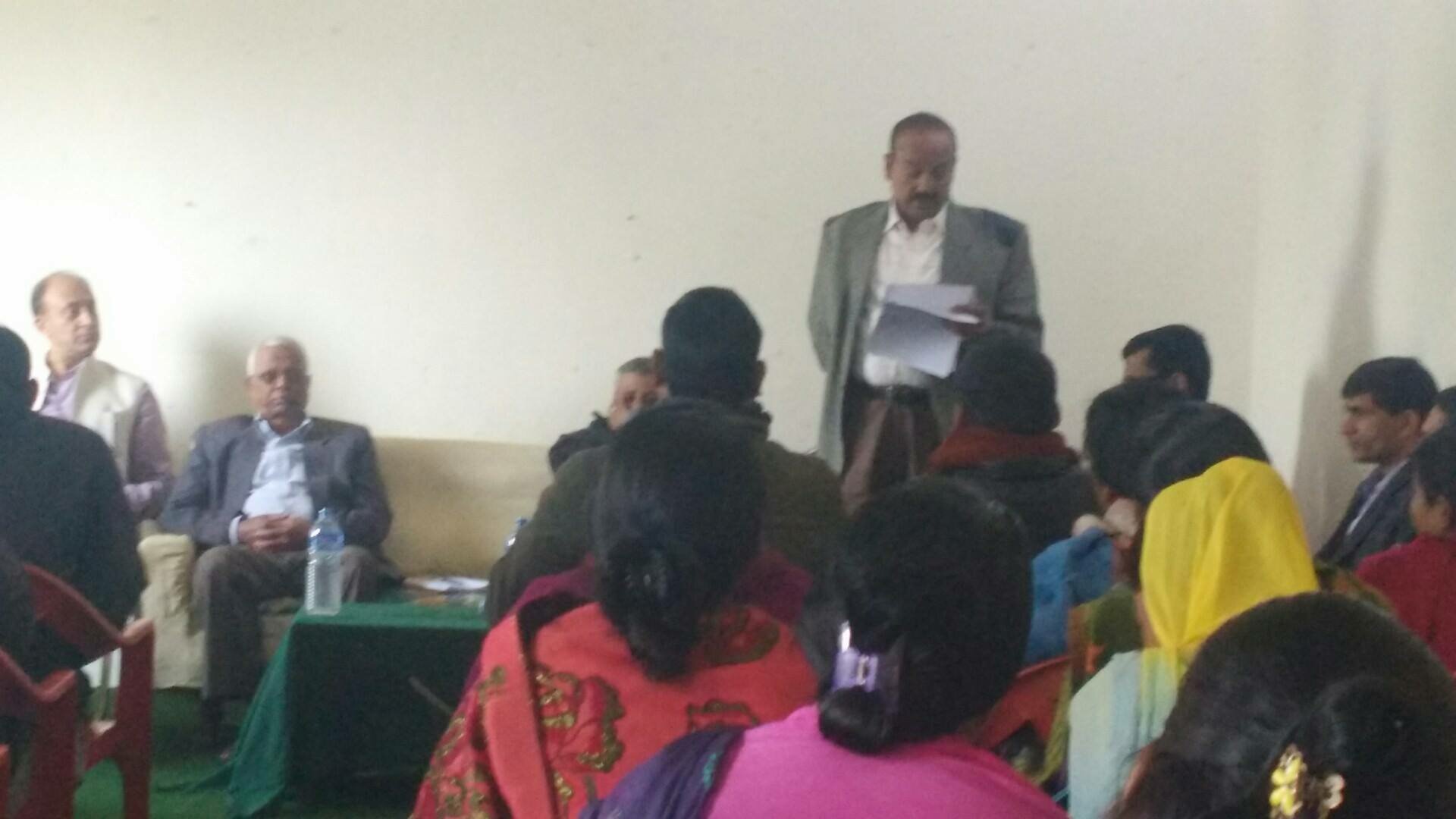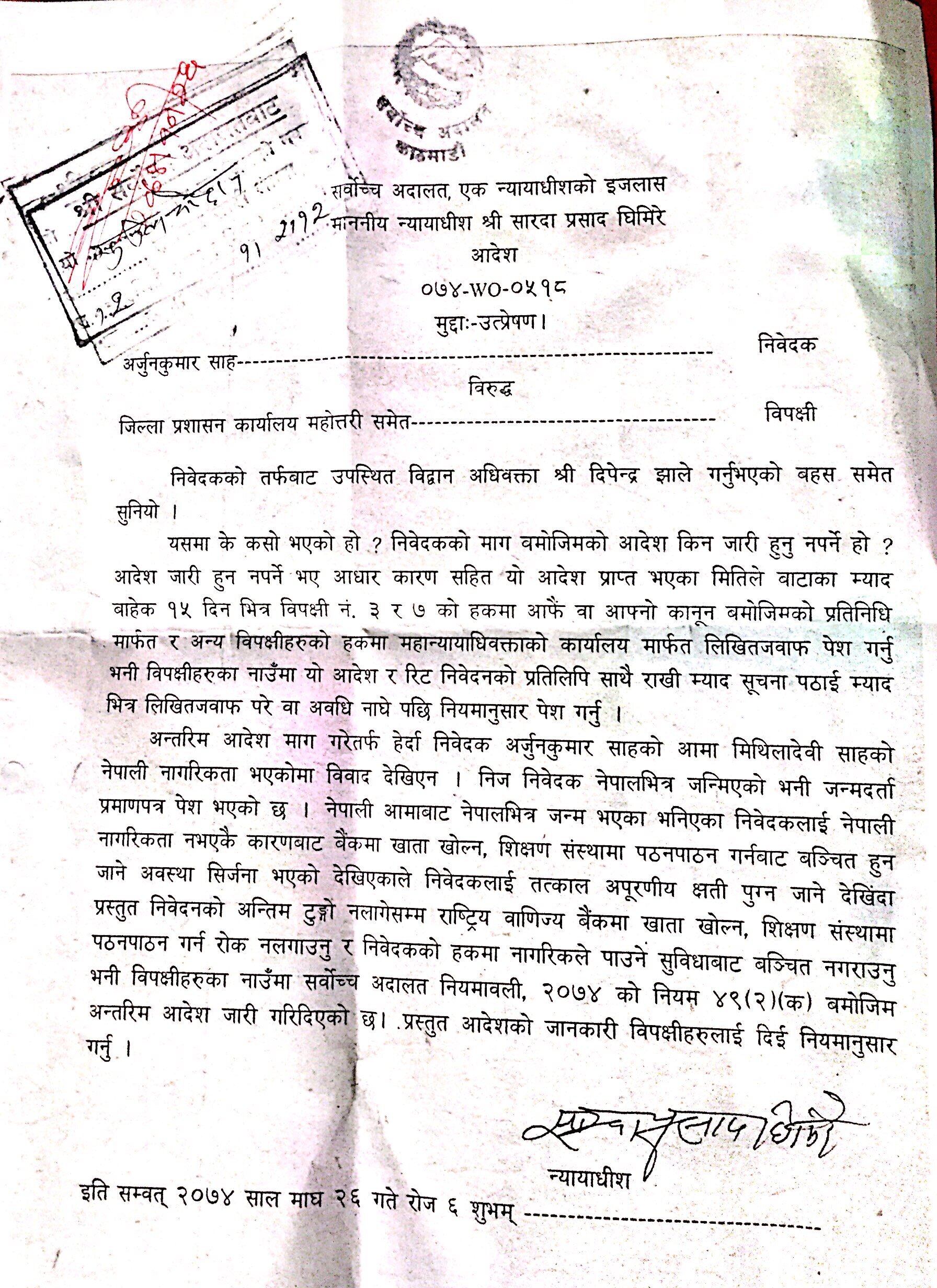Press Release
26 June, 2018
Kathmandu
On the occasion of International Day in Support of Victims of Torture, Terai Human Rights Defenders Alliance (THRDA) strongly urges the Government of Nepal and the concerned authorities to provide adequate compensation to the torture victims and implement the court decisions effectively. Torture is prohibited by both domestic and international laws. THRDA also reiterates that as a state party to the Convention against Torture and other Cruel, Inhuman or Degrading Treatment or Punishment, the Government of Nepal has an obligation under this convention as well as Nepal’s constitution to provide easy, accessible and effective justice to the victims of torture and book the perpetrators.
THRDA has been closely documenting and monitoring the cases of torture and ill treatment. It has regularly been providing legal aid as well as medical assistance to torture victims since 2011. THRDA has observed that torture victims face many hurdles when they file cases against their perpetrators. Even after the the Court delivers verdicts in favour of the victims, the decisions that award compensation to the victims, remain unimplemented for long time since the court delivers the verdict.
Concerned agencies’ failure to ensure compensation to the victims in time, discourages other victims from filing cases against their perpetrators under the Compensation Relating to Torture Act (CRTA) mainly because they do not want their time and resources they invest in the court proceedings go to waste. Victims are not aware whether or not departmental actions were taken against their perpetrators as per the court order.
Here are some examples of the cases of torture victims who are struggling to receive compensation amount awarded by the courts.
- Kalu Chaudhary, who was tortured by Police Constable Dhirendra Prasad Pant under the direction of Police Inspector Pushkar Bahadur Chand inside police custody of Ward Police Office in Mahendranagar, was awarded compensation of NPR 25,000 by District Court Kanchanpur on July 1, 2015 for the torture inflicted on him by the police authorities in the detention centre.The court also recommended departmental action against the guilty police personnel.
As per the Torture Compensation Act, Chief District Officer must provide the amount of compensation to the applicant within 35 days of receipt of the application.
However, Kalu has not received the compensation amount from District Administration Office, Kanchanpur.
After receiving the formal notice from the court on December 14, 2016, Kalu filed an application in the District Administration Office, Kanchanpur on January 11, 2017 claiming compensation awarded from the District Court of Kanchanpur.
Despite going from pillar to post in last three years, Kalu has not received the compensation amount yet.
- Ram Bhajan Yadav (Ahir) of Rupandehi district filed a case at the District Court, Rupandehi, and the court awarded NPR 20,000 as compensation to the victim and recommended departmental action against the guilty police personnel who tortured him on 15 June 2014. He applied for the compensation in DAO, Rupandehi in April 9,2015, but he has not received the compensation amount yet.
- Phul Chandra Pasi, Ramesh Yadav and Dinesh Teli of Rupandehi district filed cases in the district court of Rupandehi claiming compensation and departmental action against the police personnel who had tortured them. The court, on 22, June 2014, awarded NPR 3000 compensation for each victim and recommended departmental action against the guilty police personnel.
It is clear that in the cases of torture, the victims faces a number of hurdles to get justice such as delay in justice delivery, lack of victims/witness protection, low amount of compensation andno proper diagnosis of physical and mental torture by doctors among others. Furthermore, even after getting decision of the court, a victim has to face hardship to get a small amount of compensation and s/he has to report to the District Administration Office many times.
Statutory provision for implementation of the decision
As per Compensation Relating to Torture Act, 1996
Execution of the decision: (1) After the final decision on provision of compensation to a victim, the victim or his/her nearest heir, in the event of his/her death, has to make an application, accompanied by a copy of the decision made by the District Court on provision of compensation, to the Chief District Officer of the District where the victim has been detained, for having amount of compensation within one year from the date of receipt of a notice of such decision. (2) The Chief District Officer has to provide the amount of compensation to the applicant within thirty five days of receipt of the application referred to in Sub-section (1).
Justice Delayed Justice Denied
Kalu Chaudhary said he has been frequently visiting District Administration Office of Kanchanpur and District Police Office but he has not received the compensation amount.
” It has been years that I have been visiting the offices approximately in every week but concerned authorities do not respond to me properly. Although the government officials have assured me that I will get my compensation, I doubt their word,” said Kalu Chaudhary.[1]
Kalu Chaudhary, who was tortured four years ago, is still suffering from pain. Due to pain, he can not load anything heavy on his head and stand still for longer period.
On the other hand, Chief District Officer of Kanchanpur, Kumar Bahadur Khadka said his office had written formally and directed District Police Office to pay the compensation to the victim.
As per Compensation Relating to Torture Act, District Administration Office is the one responsible for providing compensation to torture victims, but it seems that CDO Khadka is trying to pass the buck.
Similarly, SP Dilli Raj Bista of District Police Office, Kanchanpur, said he was not aware about the issue and asked Kalu Chaudhary to contact him personally.
Likewise, another victim Phul Chandra Pasi said he had not received the compensation amount yet. The DAO has not informed him when he will get the amount.
“Compensation amount is not a big deal but getting justice and self respect are the things that matter,” said Pasi.
Similarly, Ram Bhajan Yadav said he would get justice when the DAO provides him his compensation.
On the other hand, Chief Distirct Officer of Rupandehi, Uday Raj Rana Magar asked Ram Bhajan Yadav to visit the office on June 13 and submit the documents once again. The victim went to the DAO but the Chief District Officer was not available there.
Call for Action
THRDA Alliance welcomes the step of the Government of Nepal that it has criminalized torture under its National Criminal Code Act and hopes that effective investigation, prosecution and adjudication system will make the legal remedies to the victims accessible and effective. THRD Alliance, however, strongly urges that the responsible authorities must provide compensation to the victims as per court verdict and should also respect the court verdict. It also urges the Government of Nepal to create a “compensation fund” in every district so that victims can receive compensation easily and on time.
Background
- History of International Day in Support of Victims of Torture, 26 June
In 1948, the international community condemned torture and other cruel, inhuman or degrading treatment in the Universal Declaration of Human Rights adopted by the United Nations General Assembly. In 1975, responding to vigorous activity by non-governmental organizations(NGOs), the General Assembly adopted the Declaration on the Protection of All Persons from Being Subjected to Torture and Other Cruel, Inhuman or Degrading Treatment or Punishment[2].
During the 1980s and 1990s, progress was made both in the development of legal standards and instruments and in enforcement of the prohibition of torture. The United Nations Voluntary Fund for Victims of Torture was established by the General Assembly in 1981 to fund organizations providing assistance to victims of torture and their families.
The Convention against Torture and Other Cruel, Inhuman, or Degrading Treatment or Punishment was adopted by the General Assembly in 1984 and came into force in 1987. Its implementation by States parties is monitored by a body of independent experts, the Committee against Torture.
The first Special Rapporteur on torture, an independent expert mandated to report on the situation of torture in the world, was appointed by the Commission on Human Rights in 1985. During the same period, the General Assembly adopted resolutions in which it highlighted the role of health personnel in protecting prisoners and detainees against torture and established general principles for the treatment of detained persons.
On 12 December 1997, by resolution 52/149, the UN General Assembly proclaimed 26 June the United Nations International Day in Support of Victims of Torture, with a view to the total eradication of torture and the effective functioning of the Convention against Torture and Other Cruel, Inhuman or Degrading Treatment or Punishment.
1.2 Significance
Torture is a crime under international law. According to all relevant instruments, it is absolutely prohibited and cannot be justified under any circumstances. This prohibition forms part of customary international law, which means that it is binding on every member of the international community, regardless of whether a State has ratified international treaties in which torture is expressly prohibited. The systematic or widespread practice of torture constitutes a crime against humanity[3].
26 June is an opportunity to call on all stakeholders including UN Member States, civil society and individuals everywhere to unite in support of the hundreds of thousands of people around the world who have been victims of torture and those who are still tortured today.
Since, incidents of torture in police detention centre of the country is reported in large number, it would be significant to remind and make concerned authorities accountable.
- Celebration of International Day in Support of Victims of Torture in Nepal
National Human Rights Commission-Nepal, constitutional body of the country, along with other national and international organizations working in the area of human rights also organises various programmers to mark the day every year.
Similarly, THRD Alliance, which has been closely monitoring detention centres, documenting incidents of torture and providing legal aids to the victims, has also been organising various programmes in federal, provincial and local levels.
- Torture situation of Terai/Nepal
Nepal being party state to many international human rights treaties including the Convention against Torture, Cruel, Inhuman and Degrading Treatment or Punishment has constitutionally guaranteed the right against torture.
Despite government’s ratification of the Convention against Torture (CAT) on May 14, 1991, and the subsequent promulgation the Torture Compensation Act (TCA) 1996, statistics show that torture is still prevalent in detention centres, mainly to extract confessions[4].
Data collected by the THRD Alliance between January to May (2018) also show the fact.
THRD Alliance’s human rights lawyers and human rights monitors visited and monitored detention centres and interviewed 141 detainees in six districts—Banke Bardiya, Dang, Kailali, Kanchanpur and Sunsari between January and May.
THRDA has continuously been facing obstacles to visit the detention centres in many districts and to document the cases of torture victims.
Forty-nine out of 141 detainees interviewed, said they were tortured by Nepal Police in the detention centres s, which is more than 34 percentage. Among them, 40 detainees were mistreated, while nine were verbally abused.
The percentage shows that the situation of detainees is vulnerable and the government needs to take stern action to prevent torture in detention centres.
Since, the incidents of torture are reported in large numbers, THRD Alliance has been fighting against impunity as well as for the torture victims to ensure that they get justice.
[1] According to interviews with victim.
[2] http://www.un.org/en/events/torturevictimsday/background.shtml
[3] http://www.un.org/en/events/torturevictimsday/
[4] Torture in the Terai 2017, p.34, published by THRD Alliance, 2018



